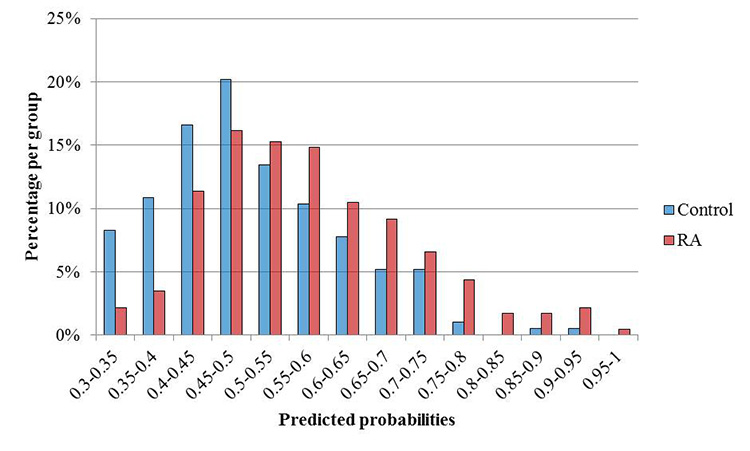Session Information
Session Type: ACR Poster Session C
Session Time: 9:00AM-11:00AM
Background/Purpose: Magnetic resonance imaging (MRI) is recommended in the diagnostic process of rheumatoid arthritis (RA), as it can detect joint damage early. However MRI-detected erosions are also present in symptom-free controls, especially at older age. It is unclear how RA-specific erosions on MRI can be distinguished from physiological erosions in symptom-free individuals. Therefore this study compared MRI-detected erosions between RA-patients and healthy controls, including evaluation of the effect of age.
Methods: 589 newly-presenting early arthritis patients (284 RA, 305 other arthritides) and 193 symptom-free controls underwent contrast-enhanced MRI of unilateral metacarpophalangeal(MCP)- and metatarsophalangeal(MTP)-joints. Total erosion score according to the RAMRIS method, number, severity, location of erosions and simultaneous presence of MRI-detected inflammation (synovitis and/or bone marrow edema) were compared between groups; participants were categorized in three age-groups (<40, 40-59, ≥60).
Results: RA-patients had higher total erosion scores than controls but there was large overlap of MRI-erosion scores between RA-patients and controls, as visually no separate clustering of groups was observed (Figure). Severe erosions (grade≥2) and MTP5-erosions were specific for RA (specificity 98-100% and 90-98% for different age-groups). MTP1-erosions were only specific if aged<40 (specificity 98%) and erosions with inflammation if aged<60 (specificity 91-100%). ≥1 of the mentioned erosions characteristics were present in 28% of RA-patients. Comparing RA-patients with other arthritides revealed that severe erosions and MTP5-erosions remained specific for RA (specificity ≥90%) as well as MTP1-erosions if aged<40 (specificity 92%), in contrast to erosions combined with inflammation (specificity 49-86%).
Conclusion: Whilst RA-patients at disease presentation had significantly higher erosion-scores than controls, scores of individuals were largely overlapping. Erosion characteristics specific for RA were identified, but were present in a minority of RA-patients.
Figure: Predicted probabilities of having RA (probability of 0 indicates 0% chance of having RA and probability of 1 indicates 100% chance of having RA), obtained from logistic regression. The total MRI-detected erosion score was used to predict whether a patient had RA.
To cite this abstract in AMA style:
Boeters DM, Nieuwenhuis WP, van Steenbergen HW, Reijnierse M, Landewé RBM, van der Helm-van Mil AHM. Are MRI-Detected Erosions Specific for RA? a Large Explorative Cross-Sectional Study [abstract]. Arthritis Rheumatol. 2017; 69 (suppl 10). https://acrabstracts.org/abstract/are-mri-detected-erosions-specific-for-ra-a-large-explorative-cross-sectional-study/. Accessed .« Back to 2017 ACR/ARHP Annual Meeting
ACR Meeting Abstracts - https://acrabstracts.org/abstract/are-mri-detected-erosions-specific-for-ra-a-large-explorative-cross-sectional-study/

